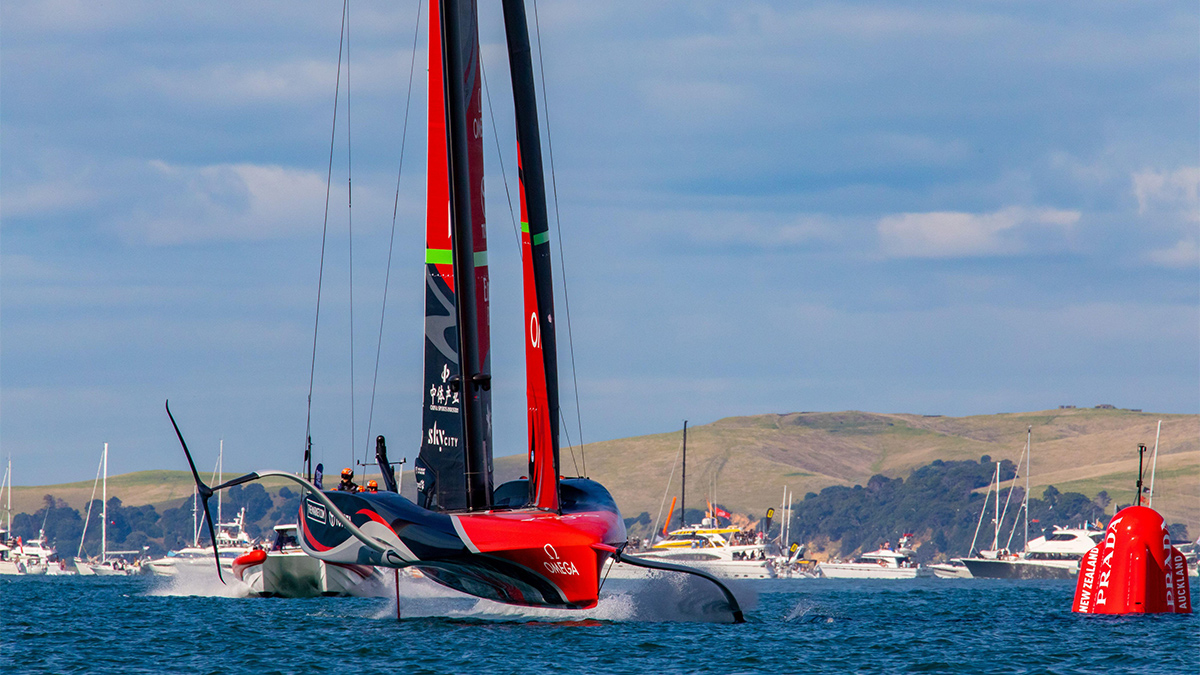Published:

International sailing events should try to reduce the underwater noise they create to avoid impacting marine wildlife, new research led by Heriot-Watt University in Edinburgh, Scotland, suggests.
Scientists at the University's Institute of Life and Earth Sciences found that noise from large groups of spectator boats – some of them with hundreds of motorised vessels – was loud and sustained long enough to potentially impact marine mammals, fishes and invertebrate species who rely on their intricate hearing systems for processes including foraging, communication, reproduction, orientation and avoiding predators.
Underwater noise from motorised vessels is particularly problematic.
The research, published in the journal, Marine Pollution Bulletin, involved collecting and measuring acoustic recordings around racecourses during the 36th America's Cup in the Hauraki Gulf, New Zealand in 2021. The international yachting race, which is the world's largest competitive sailing event and has been staged since 1851, attracted almost 300,000 in-person visitors.
Matt Pine, an Honorary Research Fellow at Heriot-Watt's School of Energy, Geoscience, Infrastructure and Society, where the Institute of Life and Earth Sciences is based, led the research. He said: “When sailing events like larger regattas are being planned, the potential impact of underwater noise pollution from spectator flotillas should be considered, especially for events happening in ecologically significant areas.
“Underwater noise from motorised vessels is particularly problematic, as studies have found it increases stress levels in many marine species and can reduce their success in reproduction, foraging and social interactions. Noise pollution can also cause some species to avoid or move away from their original habitats.”
All large, internationally-renowned sailing events should make greater efforts to limit the potential impacts underwater noise from motorised vessels, the researchers conclude. Thousands of sailing regattas are staged around the world every year. In the UK in 2024, for example, sailing regatta events include the Scottish Series regatta on the West Coast of Scotland in May; the Plymouth Regatta in July and Cowes Week, one of the UK's longest-running sporting events, in the Solent off the Isle of Wight in early August.
An estimated 10,468 vessels attended the three different race events of the 36th America's Cup between December 2020 and March 2021, the researchers say. Up to 1,300 vessels a day also sailed to and from the racecourses at regular intervals.
The scientists found that sound level increases were observed several kilometers beyond the racecourses boundaries and remained high well beyond the duration of the races themselves. On a typical race day, sound levels between 6am and 9pm around the racecourse were 5 decibels higher than on a ‘control day,' when no racing took place. This is roughly more than three times normal sound energy levels. Sound energy is essentially the vibration caused by sound.
Protection measures taken by event organisers, such as restricting spectator vessel speeds to 5 knots to reduce the risk of striking marine mammals, will have helped reduce underwater noise levels, the researchers acknowledge. But further improvements are needed. These could include introducing designated areas where spectator vessels are encouraged to congregate. Marine mammal detection platforms could also be used to identify visually or acoustically when animals are near spectators, so best noise practices could be adopted or monitored.
Other suggestions include staggering the exit of vessels to break up spectator flotillas into smaller groups and encouraging spectators to watch from on-land locations. Spectators could also be given guidance on measures or behaviour changes to reduce the amount of noise from their vessels. For example, avoiding sudden speed changes and turning off echosounder navigation devices while the boat is idling.
Matt Pine is a marine scientist specialising in ocean bioacoustics – the science of how sound affects animals. He has a PhD in Marine Science from the University of Auckland in New Zealand.
The other authors of the paper, which is titled Not so silent spectators: How spectator vessels at international sailing regattas alter marine soundscapes, are Emily Hague and Lauren McWhinnie, both from the Institute of Life and Earth Sciences at Heriot-Watt University; Anna Kebke from the School of Biodiversity at University of Glasgow and Charlotte R. Findlay from the Department of Biology at Aarhus University in Denmark.
The research was supported by funding from the Marine Alliance for Science and Technology for Scotland-Scottish Funding Council (MASTS-SFC) Saltire Emerging Researcher Scheme – a collaborative research initiative between Scotland and Europe, a European Union Marie Skłodowska-Curie Actions Fellowship, the University of Glasgow and Heriot-Watt University.